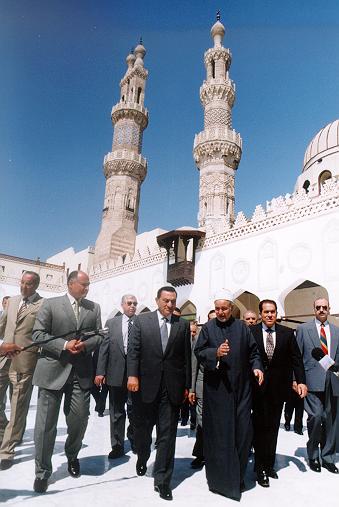
Mowlana Hazar
Imam in Cairo with President Hosni Mubarak

![]() Press Release from Aiglemont
Press Release from Aiglemont
![]() Background on Al Azhar
Background on Al Azhar
Secrétariat de Son Altesse l'Aga Khan
Aiglemont
Gouvieux, France
Cairo, 4th May, 1999 -- President Hosni Mubarak today discussed with
His
Highness the Aga
Khan, Imam of the Ismaili Muslims, an integrated plan for
development of Cairo's largest park, and innovative cultural restoration
and economic revitalisation projects being undertaken by the Aga Khan
Trust
for Culture in the capital's historic old city. Their meeting
followed
extensive site visits by the Aga Khan to the Azhar Park and the adjoining
Darb al Ahmar district during which he had frank and productive exchanges
with the Governor of Cairo, Dr. Abdel-Rehim Shehata, the Minister of
Culture Farouk Hosni Abdel Aziz and the Secretary-General of the Supreme
Council of Antiquities, Dr. Gaballah Ali Gaballah.
President and Mme. Suzanne Mubarak, who is patron of major cultural
heritage initiatives in old Cairo, were hosting the Aga Khan and his
wife,
the Begum Inaara Aga Khan, to a luncheon attended by selected members
of
the Cabinet to discuss the potential for development of historic Cairo
centered on Azhar Park and its immediate vicinity.
The 30 hectare Azhar Park will be Cairo's largest designed green space.
Landscaping currently underway on the former rubble dump will create
fountained gardens and tree-lined avenues with panoramic vistas onto
the
skyline of monuments of the old Islamic city. Situated between
the eastern
edge of the old Fatimid city and the Mameluke necropolis, the park
will
offer a spectacular panorama of historic landmarks of Cairo.
Most
recently, the Park project has incorporated the extensive excavation
of the
Ayyubid wall revealing hitherto undiscovered turrets and chambers.
Following a detailed survey of the Darb al Ahmar district, the Aga Khan
Trust for Culture's Historic Cities Support Programme has identified
a
number of buildings and spaces whose physical restoration will be
complemented by social development projects for the disadvantaged
communities resident in the neighbourhood.
The Aga Khan's historic links with Egypt and Cairo, in particular, go
back
to the tenth century when the Aga Khan's ancestor, Fatimid
Caliph al-Mui'zz
laid the foundations of the city in the year 969. The two centuries
of
Fatimid rule between the ninth and the eleventh centuries saw the flowering
of cultural and intellectual life, including the founding of the University
of Al Azhar, one of the oldest universities in the world.
Other activities of the Historic Cities Support Programme around the
world
include the restoration and re-use of a 14th century residence in Granada,
Spain, a 700-year old fort in Hunza, Northern Pakistan, 100 year old
buildings and an open green space in the Stone Town of Zanzibar, as
well as
rehabilitation projects in Uzbekistan, Bosnia and Syria.
The Aga Khan Trust for Culture is a non-profit institution, involved
in
recognition of architectural excellence (through the Aga Khan Award
for
Architecture) and architectural education (through the Aga Khan Program
in
Islamic Architecture at Harvard University and the Massachusetts Institute
of Technology), as well as the Historic Cities Support Programme.
The Trust is part of the Aga Khan Development Network, a group of
institutions working to improve living conditions and opportunities
in
specific regions of the developing world. The mandates of the
institutions
range from health, education and rural development to architecture
and the
promotion of private sector enterprise.
Whilst in Cairo, the Begum Aga Khan is visiting urban social projects
for
underprivileged children supported by UNESCO and will join Mme. Mubarak,
President of the Egyptian Red Crescent Society, on a visit to the Society's
headquarters.
The Aga Khan and the Begum Aga Khan are accompanied on this visit by
the
Aga Khan's younger son, Prince Hussain who has specific responsibility
for
programmatic activities of the Aga Khan Trust for Culture at the Aga
Khan's
Secretariat in Paris. They depart Cairo on 6th May, 1999.
The historical Mosque was founded in 358AH by Jawhar As-Siqilli, the Army commander of the Fatimid ruler of Egypt Al-Mu’iz Li dinallah, in the course of building the city of Cairo, following the conquest of Egypt. The mosque was completed in Ramadan 361AH (972AD). The first Jum’a (Friday) prayers were performed in the mosque on Ramadan 7, 361AH.
Al-Azhar was the first mosque to be built in the city of Cairo and the fourth in Egypt, built with the purpose of disseminating the Shi’ite doctrine. Cairo itself was the fourth city to be built in Islamic Egypt, following Al-Fustat, founded by Amr Ibn Al-As in 20 AH (641AD), Al-Azhar, by Saleh Ibn Ali 133AH (751AD) and Al-Qataie by Ahmed Ibn Touloun 256AH (870AD)
Al-Azhar Mosque is composed of the core building founded by Gohar As-Siqilli. Built to a unique Fatimid style, this portion contains 76 white alabaster columns. Beyond the Fatimid Mihrab (niche) there is the Ottoman portion with 50 marble columns, with a raised flouring. There follow the renovations and additions made by Mameluk Sultans, on top of whom comes Prince Abdul Rahman Katukhda.
During the 14th Century AD, there was added Al Taibarsid School, ordered to be built by Prince Ala-Uddin Al- Taibarsi, who served as treasurer during An-Nasser Ibn Qalawoon’s reign. Another school namely Al-Aqbaghawi School was built. Both schools were intended for the study of jurisprudence, in addition to pavilions (Rowaqs), built upon the orders of Mameluk Sultan as boarding quarters for students. Each district of Egypt and other Islamic parts of the world was assigned a separate quarter.
This renovation project has been completed within the context of the Government’s policy of maintaining and conserving religious monument. The project allowed for the preservation, refurbishing and enriching of all monumental components of the mosque. An area of 3,300sq.m.were added to the mosque, thus increasing the total area to 7,800sq.m., accommodating around 20,000 worshippers. The completed restoration work, undoubtedly enhances the status of Al-Azhar as an outstanding center of Islamic call and Egypt’s leading position in the Islamic world.